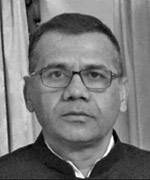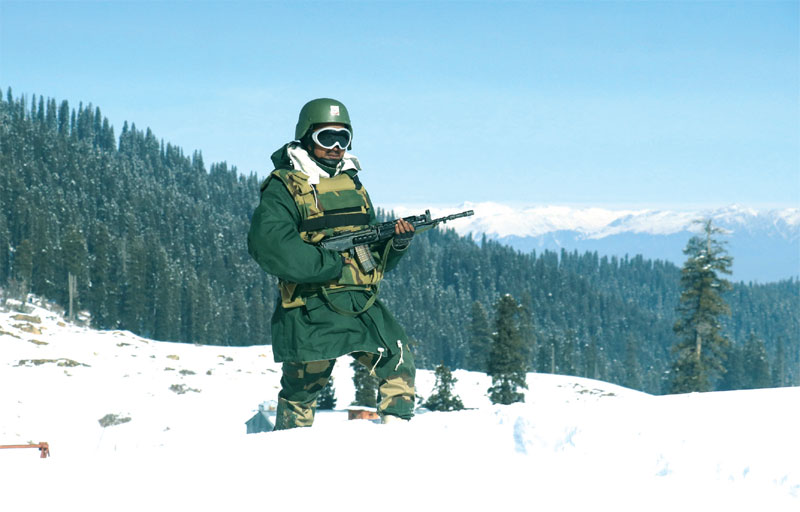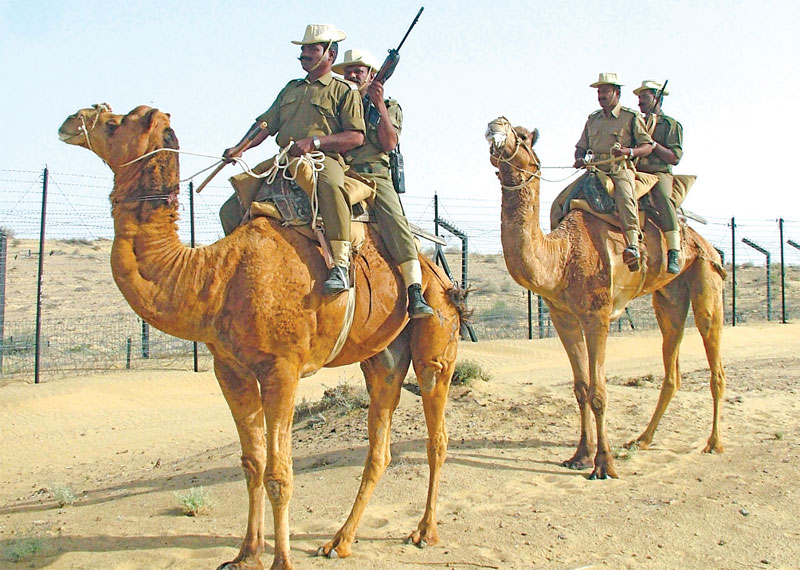The government should delink the border guarding forces from the generic CAPFs
 R.C. Sharma
R.C. Sharma
Primary Role: Border Security
The basic domain of border guarding forces is border security and border management. However, the government has discretion to utilise border-guarding forces for internal security or disaster management. Thinning troops from the border for internal security makes the border porous, making it easier for smugglers, terrorists/ militants to operate. The need is to plug gaps in border guarding and bring down smuggling, illegal migration and cross border infiltration This will strengthen and enhance internal security by minimising and eliminating role of external players to create trouble.
In the present dynamic security environment, the thin line between border and internal security is blurred and a holistic, balanced view needs to be taken by the government to make the border and internal security fool-proof by plugging gaps both in terms of manpower and equipment needs.
Border management is a separate professional domain enveloping peacetime border guarding and wartime integration with army. This requires border-guarding forces to train for both peacetime and wartime roles. It will ensure professional border management and integration with army for execution of wartime role. Training and role execution makes border-guarding forces akin to the army.
Secondary role: internal security
The secondary role of border guarding forces is to fight internal security challenges like insurgency, left wing extremism (LWE), ensure free and fair elections and fight natural calamities and disasters. The officers and men of the border guarding forces have professional acumen to guard borders, fight war and take on internal security challenges successfully in coordination with the police.

Kargil Review Committee Report
The Kargil Review Committee report (KRC) brought into focus grave deficiencies in India’s security management system. On reviewing the report, the group of minister’s report on national security stated that it is desirable to employ border guarding forces on the principle of ‘one border-one force and that Border Guarding Forces must be deployed for counter-insurgency and other allied duties after raising of additional battalions. “Once these additional battalions are in place, the CPMFs (Central Para Military Forces), other than the CRPF, may have to be mobilised only for short durations, in cases of extreme exigencies, natural calamities, elections etc.”
In chapter V, Border Management Para 5.1 of the report says, ‘India has 14,880 kms of land border running through 92 districts in 17 States and a coastline of 5,422 kms touching 12 States and Union Territories (UTs). India also has 1197 islands accounting for 2094 kms of additional coastline. In fact, barring Madhya Pradesh, Chhattisgarh, Jharkhand, Delhi and Haryana, all other States in the country have one or more international borders or a coastline and can be regarded as front-line States from the point of view of border management’. In para, 5.8 ‘Problems of Border Management’ Sub Para ‘D’ & ‘E’, the report says, ‘Border Guarding Forces need to be distinguished from central police organisations. Being more akin to the Army and different from central police organisations, which are called in aid of civil power from time to time, they need to be appropriately strengthened in terms of both equipment and manpower. The repeated withdrawal, in large numbers, of para-military forces from border guarding duties for internal security and counter insurgency duties has led to a neglect of the borders. These forces have also been unable to perform optimally due to cannibalisation of battalions and even companies.’
In the chapter on border management, under recommendations para 5.13, the group of ministers emphasises: ‘Border Guarding Forces need to be distinguished from other CPMF and the central police organisations because of their distinctive functions. It is imperative that the border guarding forces are not deployed in the states to deal with internal disturbances, law and order duties and counter insurgency operations. Withdrawal of Border Guarding Forces for such duties limits their capabilities to guard the borders effectively. While there may be exceptional circumstances where it may be necessary to utilise the services of Border Guarding Forces for performing law and order/counter-insurgency duties, as a rule, these forces should not be withdrawn from the borders.’
Follow up of KRC recommendations
The group of ministers was concerned with unprofessional management of border guarding forces. For improvement in the functioning and management of border guarding forces, it constituted task force on border management headed by former Union home secretary Dr Madhav Godbole. Madhav Godbole while delivering Y.B. Chavan Memorial lecture ‘Securing India’s Borders: The way Ahead’ on 3 December 2014 at Institute of Defence Studies and Analysis (IDSA) lamented poor follow-up action on the recommendations of the Task Force.
He said, “It is gratifying to see that, as a follow-up of the recommendations of task force on border management (TFBM), the Department of Border Management was created in the MHA (Ministry of Home Affairs) in January 2004, though unfortunately, it does not seem to have made much difference to action on the pertinent issues. The task force was anxious that guarding of the borders should not be neglected by withdrawing border guarding forces for internal security or other duties such as VIP security. The ITBP seems to have been drafted for VIP security duties in recent years. Same is true of some other border guarding forces. The task force had emphasised that the state governments may be persuaded to expand their police forces to reduce the draft on central forces. The task force had also recommended the strengthening of other forces such as the CRPF (Central Reserve Police Force), and the CISF (Central Industrial Security Force) to take over VIP security duties. It was suggested that a firm policy may be announced by the central government. This does not appear to have happened so far”.
In addition to fault lines pointed out by the Task force on border management, there are issues and flashpoints which call for separation of border guarding forces from the CAPF (Central Armed Police Force) umbrella and their reorganisation as ‘Border Guarding Forces of India’ (BGFs) or Indian Border Guards. Whether BGFs are kept under home ministry or defence ministry or a separate ministry such as ministry of border management, a holistic view of their role and task needs to be taken, to arrive at a decision. Issues/ reasoning, which justify BGFs reorganisation independent of Central Armed Police Forces (CAPFs) for better professional management, are as under:
Border Management & Border Security
Border security encompasses physical domination of the international boundary to check illegal infiltration, smuggling of drugs, arms and ammunition and contraband goods. It also includes inculcating a sense of security in border population through effective and efficient border management, which also encompasses development of border areas.
Though border management has a wide canvas, it has not yet become more important than border security. Border-guarding forces have, despite constraints, ensured border security professionally. How ever, their piecemeal deployment has led to gaps in border security. There is an urgent need to insulate border-guarding forces from an internal security role which calls for frequent withdrawals—leaving the borders porous.
Border guarding forces have the dual role of peace-time border guarding and assisting the Army during war. They need un-interrupted training for both roles. That is only possible if diversion from the primary role is kept to the barest minimum. Border management as of now, is a misnomer. It truly can be called border management only once stakeholders integrate and complement each other to strengthen national security. The pushes and pulls of a federal political structure, has not allowed true integration of stakeholders, thus affecting national security. There is a need to carry out desired changes in constitutional arrangements, to strengthen border guarding. Designate the BGF as a separate entity and place them under a separate ministry, which may be called ministry of border management.

Illegal Migration
The gravity of illegal migration from Bangladesh hardly needs to be over-emphasised. It has changed the composition of several areas not only in the states adjoining Bangladesh but far off places like Delhi. Fears are being expressed that if the present trend continues, India may be faced with a demand for second partition. The illegal migrants are so well assimilated that in Nagaland, for example, illegal migrants are known as ‘Naga Mias’. The term ‘Naga Mias’ was used by Madhav Godbole in his speech at the Institute of Defence Studies and Analyses (IDSA) while delivering the lecture ‘Securing India’s border—A Way Ahead’. The lecture is available on the IDSA website.
In parts of Assam, it has led to repeated large-scale racial and communal violence. According to present estimates, over 3 crore illegal Bangladeshi migrants are residing in India. Earlier, in a public interest litigation the Supreme Court and very recently in November 2014, Delhi High Court have castigated the central government for neglecting the issue and not taking any worthwhile action. Illegal migration is related with efficient border management and calls for functional reforms in border management domain by making policy changes to make BGFs part of separate domain detached from CAPFs to effectively handle border security as part of concentric circle of border management.
Conceptualised and Raised as Specialised Entity
The BSF was conceptualised as a specialised force on infantry pattern. It holds true for other border guarding organisations too. However, conceptualisation parameters now stand diluted drastically. Home minister Y.B. Chavan, while piloting the bill for constitution and regulation of the Border Security Force in Parliament said “The purpose of this force is as I have said to ensure security of borders of India, secondly, to secure or instil, a sense of confidence in the people living on the borders and at the same time take precautions to see that smuggling and all the types of crimes that take place on borders do not take place”.
He further said, “Naturally the requirements of such force are special type and we had to take a different type of organisation, different type of training and we have practically to give weaponry to this force which is as good as that of an infantry”. As per N.K. Somani, member of Parliament from Nagaur in Rajasthan in the fourth Lok Sabha, “… this is a paramilitary body. The status and proficiency required by the personnel of this force has to be somewhere between armed police wing of various states and armed wing of our Army”.
Randhir Singh, another member of Parliament from Rohtak in Haryana, in the fourth Lok Sabha, while debating the BSF Act in Parliament said, “I do not agree that it is merely a police force. This force is midway between the Indian Army and police. I have a few things to say about jawans also. This may not be very relevant from a legal point of view but from a moral point of view and from the point of view of the organisation, you would kindly see that jawans are put on same level as jawans of Indian Army. So far as the work is concerned, these jawans are not in any measure. putting less work than boys of Indian Army.” On pay and allowances, he said, “About their pay and allowances, what I feel is that not only their pay and allowances but also ranks of Indian Army jawans are more attractive and they command greater respect than the jawans of Border Security Force. Will the hon. minister put them on par with the jawans of Indian Army? The pay and allowances of jawans of Border Security Force should be the same as those of Indian Army jawans”.
The parliamentary debates clearly reflect the sense of the house that BSF was raised on the pattern of infantry and was to be trained and equipped accordingly in keeping with role and task. In addition, it was to be at par with Army in terms of pay and allowances and other amenities. However, over a period, border-guarding forces have been diluted to the position of civilian organisation, which is detrimental to the health of border guarding forces and national security.
First line of defence with independent identity
Chavan said during the debate on BSF act “What is the task of this force? Let us come to that. Although it is nearer the task of the army, yet I must say that, with all emphasis at my command, it is not yet army, I know it is exposed to a certain extent to the same dangers that the army faces, in the beginning. I have no doubt about it. It is true as some members said it will be the First Line of Defence in a sense yes, because the first impact of any aggression, the first brunt, will be borne by the security force. Certainly, at that time, they will be asked and are expected to take the first brunt, but they will not be expected to strike back in the same way as we expect the army to do”.
Balraj Madhok, yet another member of Parliament from South Delhi, in the fourth Lok Sabha said, “Shanti kaal main iss prakaar ka bal first line of defence hoga”. Even former Prime Minister Indira Gandhi declared BSF as the first line of defence, in the true spirit of parliamentary sense. In her letter to K.F. Rustam, the first director general of BSF after the 1971 war, she says, “As the first line of defence, the Border Security Force had to bear the immediate brunt of enemy onslaught. The manner in which they faced enemy fire and the support they gave to the army has played a crucial role in our ultimate success.”
The sense of parliamentary debates clearly brings out that the BSF is not police. It is a specialised force raised for guarding the international border with Pakistan and with both Bangladesh and Pakistan post 1971. It is true of other border guarding forces like the ITBP and SSB. The BSF has proved its mettle in the 1971 war and so has the ITBP while assisting the Army during various emergencies on the Line of actual control. Now is the time that the government must take revolutionary reforms in the structure of border guarding forces. It must take them out of the umbrella of CAPFs and designate them as Border Guarding Forces of India in tune with the spirit of their raising. That will go a long way in strengthening professionalism in the border guarding forces and strengthening national security.

